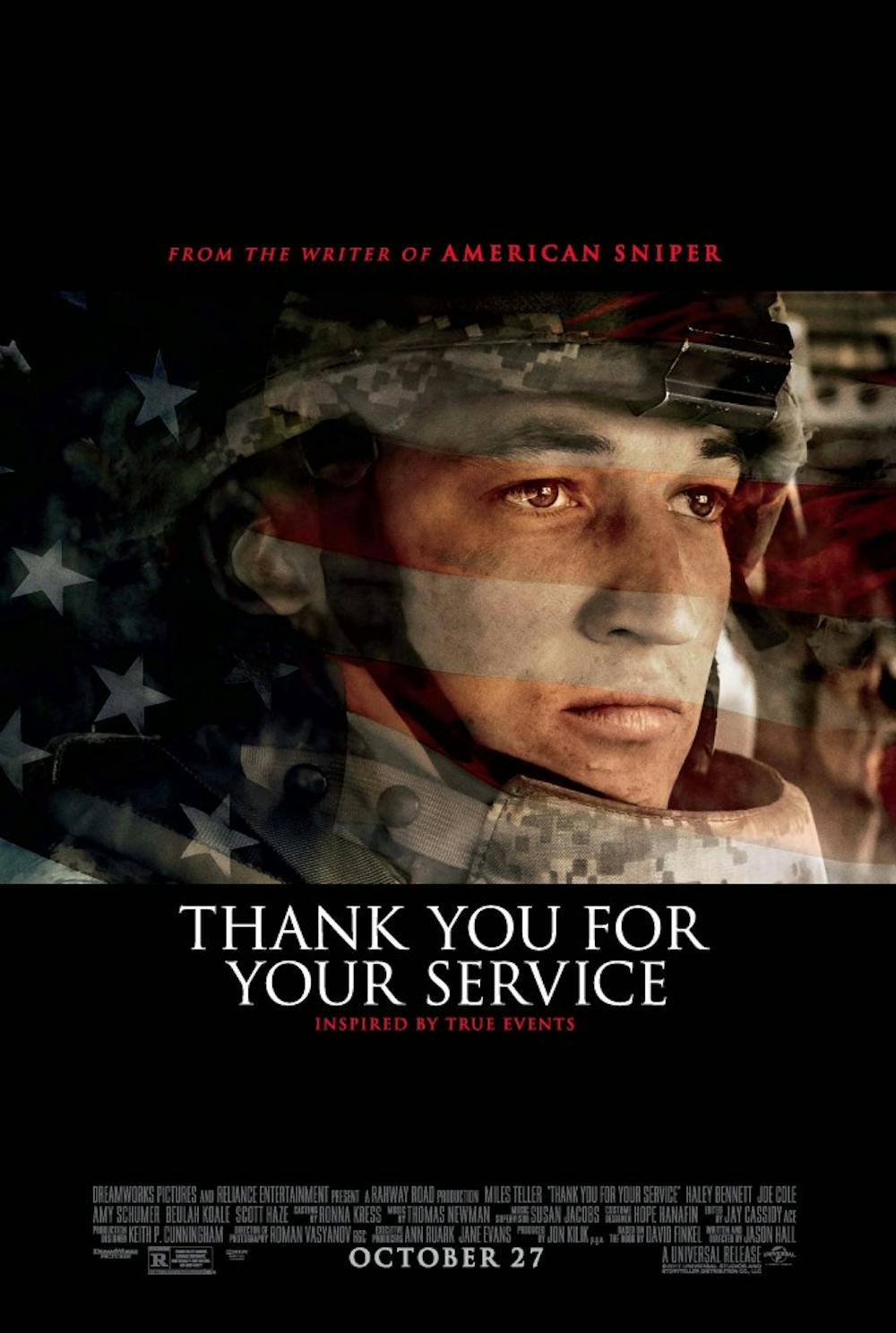From: Silver Screen
‘Thank You for Your Service’ gives audiences an idea what it’s like to have PTSD

Jason Hall’s directorial debut, “Thank You for Your Service,” allows audience members to experience trauma alongside a strong cast that successfully portrays the impact of post-traumatic stress disorder. Nonetheless, a rushed resolution makes the story feel incomplete.
The plot follows Schumann (Miles Teller), Solo (Beulah Koale) and Waller (Joe Cole), as they struggle with PTSD following their involvement in the Iraq war. The men look forward to reuniting with their families, hoping that it will make the struggles of their service feel worthwhile. Unfortunately, there are some scars that family alone can’t fix. Each soldier desperately seeks help, as well as dangerous methods to cope with the pain.
Viewers are thrown into the horrors of war within the first five minutes when a soldier is unexpectedly shot in the head. The camera doesn’t pan away at the sound of the gunshot, nor does it cut to black. Instead, the audience sees the graphic imagery of the bullet wound as blood pours from the soldier’s head and onto Schumann’s face as he fumbles to carry him to safety. The image is horrifying, yet realistic, and it becomes difficult to look away. It not only becomes etched into Schumann’s mind, but also the minds of the viewers. That opener, along with other similar scenes scattered throughout the film, are successfully designed to make audience members feel fraught with fear.
The film also presents moments of tension so acute that onlookers may brace themselves for the sound of another gunshot, or shut their eyes to avoid witnessing a character’s demise. The soldiers’ haunting past refuses to stay in the past, making itself known in leisure activities, including hunting, video gaming and sex. When such moments of enjoyment are robbed, any chance of escape is rendered futile. Apathetic or sympathetic feelings are suddenly transformed into pure empathy as viewers experience the horrors of anxiety alongside the characters. Even if it’s a fraction of what actual soldiers may endure, the depiction of such paranoia as it moves from the mind into reality puts their emotions in perspective and makes everything seem more real.
Hall judiciously uses silence to feed an air of emptiness and solitude that transcends the movie in its entirety. Something always seems to be missing, even in moments where one would expect joy and gladness as with a bar scene where Schumann, Solo and Waller sing and dance to Haddaway’s “What is Love?” together. You can hear the men’s feet as they scuff against the floor, focusing on them alone. It’s fun for a night, but isn’t enough to prevent the disastrous turn of events the following day. The hollow feeling remains prevalent throughout the bits of dark humor scattered throughout the film, feeding into the feeling of discomfort. One soldier casually jokes about his wife leaving him after he woke up with his hands around her neck. It’s stale and off-putting, but at the end of the day it’s a joke not meant to be entirely comical. Rather, it emphasizes how much easier it is for one to laugh at one’s own pain rather than allow it to become all-consuming.
Despite all of these strong points, there were a few places where the film was lacking. The rush that launched the beginning of the movie was necessary, while the rush at the end felt incomplete. As the unaddressed burdens of the past are gradually brought to light, the words of Amanda Doster (Amy Schumer), the widow of a fallen soldier, are somehow meant to snap everything back to normal for Schumann. Shortly after, images appear on screen of the real Schumann, Solo and Waller, filling the gap as to what happened next. While the slideshow is a fine tribute to them overall, it creates a disconnect between the Schumann character and the Schumann in real life. The audience sees a resolution for Schumann in the movie, but not the steps it took to get there. The slideshow doesn’t provide enough to satisfy viewers who watched him meticulously, waiting for that glint of hope to return as he finally receives an opportunity that can give him the help he needs. To make matters worse, the few lines Schumer had in that scene were meant to be powerful, but instead fell flat. Her dramatic acting debut made me want to feel for the pain her character went through. Alas, her delivery was weak and awkward, and I found myself cringing at her performance that was painful to watch. Fortunately, she seldom appears in the film and her role does not offset the raw strength and emotion shown by the other cast members.
The rest of the film was presented at a steady pace, with careful attention given to the storylines of Schumann and Solo. Only so much could be done with the character of Waller throughout the story, but for someone who was extremely close to the other leads, it was a surprise to see how easily his character was lost.
Overall, “Thank You for Your Service” is a beautiful film that puts audience members into the minds of veterans while shining a light on those heroes whose scars are invisible. Viewers are met with a feeling of heartfelt understanding as they’re put into the place of those who suffered via painstaking imagery and emotional portrayal. Although the film is a wonderful tribute to members of the military, I would not recommend this film for those suffering from PTSD, as the film does a fine job at making flashbacks feel all too real.
Grade: B+




